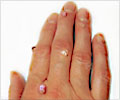More evidence to show Gardasil vaccine could be effective in men too. Latest research shows that it can prevent genital warts.
More evidence to show Gardail vaccine could be effective in men too.
The vaccine was 90 per cent effective in preventing lesions such as sexually transmitted warts that are not life-threatening, according to the placebo-controlled study of 4,000 males that was funded by the vaccine's manufacturer and presented at a medical conference in Nice, France."We see 90.4 per cent efficacy in reducing external genital lesions in males related to these four types of HPV — 6, 11, 16, 18," said Anna Giuliano, an epidemiologist at the H. Lee Moffitt Cancer Center & Research Institute in Tampa, Florida, who worked on the study.
The HPV vaccine was approved in Canada for females aged nine to 26 for the prevention of cervical, vulvar and vaginal cancer and precancerous lesions and genital warts.
The vaccine was not licensed for males in Canada or the U.S. since there was no evidence that it prevented penile cancer or other cancers associated with the human papillomavirus or HPV in men. About 40 other countries have approved the vaccine for males.
"HPV diseases are on the rise among Canadian men so I am encouraged by these new results," said study investigator Dr. François Coutlée, a professor at the University of Montreal and a clinical researcher in molecular virology at CHUM-Hôpital Notre-Dame.
The study looked at males aged 16 to 23, including 3,400 heterosexuals and 600 men who have sex with men. Participants were randomized to either receive three doses of the vaccine or placebo and were followed every six months for 36 months so far.
The 90 per cent effectiveness was in reducing external genital lesions, with three cases in the vaccine group compared with 31 cases among those given a fake vaccine.
"When parents are sitting in a room discussing with a pediatrician whether to vaccinate their child against anything, they'd like to know what the potential benefit is," said Gillison. "A parent might say 'I'm not inclined to vaccinate my child to prevent a benign genital wart.'"
The vaccine protected fewer than half of cases of HPV infection as detected in the blood.
The vaccine appeared to prevent a precancerous condition called penile/perineal/perianal intraepithelial neoplasia or PIN, with no cases reported in the vaccine group compared with three cases in the placebo group.
No serious vaccine-related adverse events were reported. In the vaccine group, 60.1 per cent of participants reported problems at the injection site such as temporary pain or redness, compared with 53.7 per cent for those who received the fake vaccine.
Government officials have been waiting for the results, but they will also need to consider its cost effectiveness in males, said Dr. Lauri Markowitz, an HPV expert at the U.S. Centers for Disease Control and Prevention.
Most people who get HPV never develop any symptoms. Cervical cancer is the most common type of cancer associated with HPV, though some types of the virus are also linked with some cancers of the vulva, vagina, anus, penis and head and neck.
In the U.S., HPV causes at least 20,000 cases of cancer each year, with about a quarter of them occurring in men, according to estimates from the U.S. Centers for Disease Control. For about every 10,000 cases of cancer, there may be one million cases of genital warts in the U.S., Coutlée said.
It is estimated there are about 41,400 cases of anogenital warts in both men and women in Canada per year.
In 2003-04, there were 491 new cases of anal cancer in Canadian men and women and 142 new cases of penile cancer, according to Statistics Canada. It's not known how many of these were associated with HPV, CBC reported.
Source-Medindia
GPL/SK
 MEDINDIA
MEDINDIA



 Email
Email








